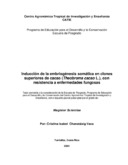| dc.contributor.author | Chanatásig Vaca, Cristina I. | |
| dc.date.accessioned | 2014-10-20T05:13:45Z | |
| dc.date.available | 2014-10-20T05:13:45Z | |
| dc.date.issued | 2004 | es_ES |
| dc.identifier | 320599 | es_ES |
| dc.identifier.uri | https://repositorio.catie.ac.cr/handle/11554/5238 | |
| dc.description | Tesis (M. Sc) -- CATIE, Turrialba (Costa Rica), 2004 | es_ES |
| dc.description | 20 ilus. 5 tab. | |
| dc.description | 87 páginas | |
| dc.description | Referencias en las páginas 67-73 | |
| dc.description.abstract | El desarrollo de una metodología eficiente para la obtención a gran escala de plantas de Theobroma cacao, que mantengan características de alta productividad y resistencia a las enfermedades fungosas que más afectan a este cultivo, permitiría, reducir el problema de suministro de semilla vegetativa para el establecimiento y renovación de plantaciones con materiales de alta calidad. Por este motivo la presente investigación pretende contribuir a la adaptación y establecimiento de la metodología de embriogénesis somática para la propagación in vitro de material élite existente en el CATIE. Los resultados mostraron la efectividad del procedimiento de desinfección, el cual permitió niveles de asepsia cercanos al 100 por ciento para los tres clones. La respuesta a la inducción de callo varió de acuerdo a los clones, tipo de explante y condiciones de cultivo, con estrecha dependencia de la acción conjunta de todos los factores, como lo demostró el análisis factorial. | es_ES |
| dc.description.abstract | The development of an efficient method for large-scale clonal propagation of Theobroma cacao plants, which maintain high yield and resistance to devastating fungal diseases can solve the supply problem of clonal material, allowing the establishment and renewal of plantations with high quality materials. This research aiMON to contribute to the adjustment and establishment of the methodology of somatic embryogenesis for in vitro propagation of high quality material existing at CATIE. The desinfection procedure was highly efficient, reaching aseptic levels of close to 100 percent in the three clones. The response of callus induction varied according to the clone, type of explants and culture conditions. There was a strong dependency among these factors as shown by factorial analysis. | |
| dc.language.iso | es | es_ES |
| dc.publisher | CATIE, Turrialba (Costa Rica) | es_ES |
| dc.subject | SOMATIC EMBRYOGENESIS | |
| dc.subject | CLONES | |
| dc.subject | CYTOKININS | |
| dc.subject | PLANT GROWTH SUBSTANCES | |
| dc.subject | DISEASE RESISTANCE | |
| dc.subject | FUNGAL DISEASES | |
| dc.subject | PLANT DISEASESTHEOBROMA CACAO | |
| dc.subject | EMBRIOGENESIS SOMATICA | |
| dc.subject | CLONES | |
| dc.subject | CITOQUININAS | |
| dc.subject | SUSTANCIAS DE CRECIMIENTO VEGETAL | |
| dc.subject | RESISTENCIA A LA ENFERMEDAD | |
| dc.subject | ENFERMEDADES FUNGOSAS | |
| dc.subject | ENFERMEDADES DE LAS PLANTAS | |
| dc.title | Inducción de la embriogénesis somática en clones superiores de cacao (Theobroma cacao L.), con resistencia a enfermedades fungosas | es_ES |
| dc.title.alternative | Induction to somatic embryogenesis in superior clones of cacao (Theobroma cacao L.), presenting resistance to fungal diseases | es_ES |
| dc.type | Tesis de maestría | es_ES |
| dcterms.rights | acceso abierto | es_Es |
| dcterms.rights | acceso abierto | es_Es |
| dc.identifier.publication | Turrialba (Costa Rica) | es_ES |


